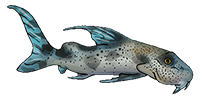| Scientific Name | Pylodictis olivaris (Rafinesque, 1818) |
| Common Names | Flat Head Catfish Appaloosa Catfish, Appaluchion, Fladhovedet Dværgmalle (Denmark), Flat Belly Catfish, Goujon, Mississippi Catfish, Mud Catfish, North American Flathead Catfish, Tabby Catfish, Yellow Catfish |
| Type Locality | Ohio River, U.S.A. |
| Synonym(s) | Ictalurus olivaris, Pimelodus aeneus, Pimelodus lutescens, Pimelodus punctulatus, Pylodictis limosus, Pylodictus olivaris, Silurus cupreus, Silurus olivaris, Silurus viscosus |
| Pronunciation | pie low dik tuss - olive ARR iss |
| Etymology | Pylodictis: From the Greek, pelos, meaning mud, and ichthys, meaning fish; in reference to the habit. The specific epithet, olivaris, means olive coloured. |
| Size | 1550mm or 61" SL. Find near, nearer or same sized spp. |
| Identification | Unique looking among North American catfish, the hands down ugliest one. The current rod and reel record from Elk City Reservoir in Kansas stands at 123 pounds. Commercial fishermen have recorded flatheads at five feet long and 140 pounds. |
| Sexing | Unknown |
| Distribution | North America: lower Great Lakes and Mississippi River basins from western Pennsylvania to White-Little Missouri River system in North Dakota, and south to Louisiana in the USA; Gulf Slope from Mobile Bay drainage in Georgia and Alabama, USA to Mexico. Transplanted elsewhere in USA. North American Atlantic Drainages, Great Lakes, Lake Michigan (click on these areas to find other species found there) Gulf Coast Drainages, Mississippi (click on these areas to find other species found there) North American Atlantic Drainages, Great Lakes, Lake Erie (click on these areas to find other species found there) Gulf Coast Drainages (click on these areas to find other species found there) North American Atlantic Drainages, Great Lakes, Saint Clair, Thames (click on these areas to find other species found there) Login to view the map. |
| IUCN Red List Category | Least Concern , range map and more is available on the IUCN species page. Last assessed 2012. |
| pH | 6.0 - 7.6 |
| Temperature | 10.0-23.0°C or 50-73.4°F (Show species within this range) |
| Other Parameters | Prefers large deep rivers. It also tolerates turbidity well. At night, it moves into shallows to feed. They rest in deep pools during the day under logs and cut banks. This fish prefers hard sand and gravel substrates. |
| Feeding | Crayfish, clams, and especially other fishes. User data. |
| Furniture | Not a fish for the home aquarium. |
| Compatibility | Anything it can not swallow. This is North America's fourth largest fish after the blue catfish. |
| Breeding | A saucer-shaped depression is excavated and thousands of eggs are laid in a yellow mass. The males guards and fans the eggs. |
| Breeding Reports | There is no breeding report. |
| Reference | American Monthly Magazine and Critical Review v. 3 (no. 5) (art. 3) (Sept.), pp 355. |
| Registered Keepers | There are 14 registered keepers, view all "my cats" data. |
| Wishlists | Love this species? Click the heart to add it to your wish list. There is no wish to keep this species. |
| Spotters | Spotted this species somewhere? Click the binoculars! There are 3 records of this fish being seen, view them all. |
| Forum BBCode | |
| Search for P. olivaris | |
| Look up P. olivaris on AquaticRepublic.com | |
 | Look up P. olivaris on Fishbase |
 | Look up P. olivaris on Encyclopedia of Life |
 | Look up P. olivaris on Global Biodiversity Information Facility |
| LFS label creator ARN ref:1.5.97.262 | |
| Last Update | 2025 Jan 01 12:19 (species record created: 2001 Apr 25 00:00) |





/siluriformes/ictaluridae/pylodictis/olivaris/1.jpg)
/siluriformes/ictaluridae/pylodictis/olivaris/2.jpg)
/siluriformes/ictaluridae/pylodictis/olivaris/3.jpg)
/siluriformes/ictaluridae/pylodictis/olivaris/4.jpg)
/siluriformes/ictaluridae/pylodictis/olivaris/5.jpg)
/siluriformes/ictaluridae/pylodictis/olivaris/6.jpg)
/siluriformes/ictaluridae/pylodictis/olivaris/7.jpg)
/siluriformes/ictaluridae/pylodictis/olivaris/8.jpg)
/siluriformes/ictaluridae/pylodictis/olivaris/9.jpg)
/siluriformes/ictaluridae/pylodictis/olivaris/10.jpg)
/siluriformes/ictaluridae/pylodictis/olivaris/11.jpg)
/siluriformes/ictaluridae/pylodictis/olivaris/12.jpg)
/siluriformes/ictaluridae/pylodictis/olivaris/13.jpg)
/siluriformes/ictaluridae/pylodictis/olivaris/14.jpg)